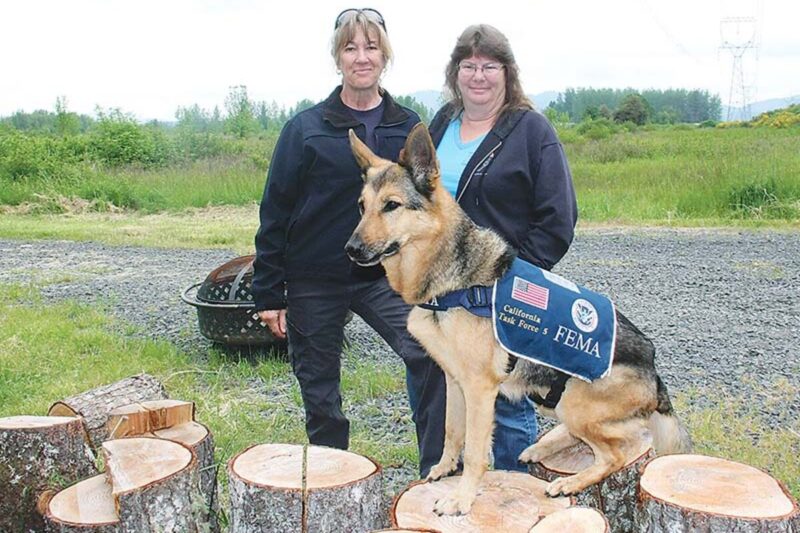Sean C Morgan
Kirsten Fulk, owner of Field of Dreams, is working with California search dog handler Sonja Heritage to expand local search dog training facilities and to begin finding and supplying dogs that help people with serious allergies and health problems.
Heritage, who has deployed internationally to some 25 different disaster zones with her search dogs over the past two decades, spent last week visiting Fulk at her business, located west of Sweet Home off Highway 20, to brainstorm ideas to move forward with these plans.
Heritage has worked in Haiti, the aftermath of Hurricane Katrina, the U.S. embassy bombing in Kenya, earthquakes in Turkey and Taiwan, the Pentagon on 9/11, the explosion of the space shuttle Discovery in Texas and many hurricanes.
She has worked with handlers and dogs in the aftermath of hurricanes Harvey and Irma.
Heritage said most search and rescue work is volunteer. In the case of major disasters where FEMA is involved, handlers receive compensation. Local responses tend to be volunteer.
Many handlers end up spending a net upward of $4,000 to $8,000 a year on their search and rescue dogs, Heritage said.
“Their most recent deployment was the Montecito (Calif.) mudslides,” Fulk said.
The slides occurred in January following last year’s devastating fire season, which destroyed vegetation and destabilized slopes in the area.
Heritage was primarily visiting Fulk to work on finding new allergy alert dogs, Fulk said.
Allergy alert dogs are capable of detecting allergens before a susceptible person enters a room, Heritage said. She described an exercise in a California elementary school where dogs found peanut material on eight different doors, each of which had a sign admonishing, “no peanuts.”
“Kirsten and I have joined forces quite a bit, working on peanut alert dogs,” Heritage said.
Fulk has been recruiting dogs for the Search Dog Foundation for years. Heritage is a canine search specialist with the U.S. Federal Emergency Management Agency California Task Force Five, Orange County Fire Authority, an urban search and rescue team.
Many dogs, they said, are good at searching, but they don’t like being high up on a pile of rubble and may be unsuited to disaster search and rescue. They can do other work.
Fulk said one dog that had been rejected as a search dog was able to go work as a diabetic alert dog.
Dogs rejected as search dogs “aren’t always great pets,” Fulk said. They’re still extremely active, like the dogs selected as search dogs.
“They need something to do,” Heritage said. “They’re ADHD dogs.”
They still want to hunt and chase things, she said. They may not be suited to life on top of the rubble pile, but their energy can be channeled into work as a seizure alert dog, a diabetic alert dog or an allergy alert dog.
Fulk said also that some rejected dogs are still suited to police work as drug detection dogs or bomb detection. She has two dogs that have gone to work as drug detection dogs.
Fulk scours dog shelters across the western states. Over the weekend, she went to Colorado to check out and possibly rescue a couple of dogs for search dog training.
“”We’re just trying to find more ways for these dogs to have a happy successful life,” Fulk said. To save these dogs from potentially being euthanized, they want to find something else for them to do.
Allergy detection is fairly new for dogs, Heritage said. It’s been around for about a decade but really growing in the past five years.
Heritage is good at evaluating dogs for these various uses, Fulk said.
She has probably trained more dogs than anyone else involved with FEMA. Directly, she has trained 40 to 50 dogs, and she has worked with many more as a FEMA evaluator and instructor.
“We’re brainstorming right now,” Fulk said. They would like to take FEMA search dogs to the next level.
Heritage spent the week looking around the property at Field of Dreams.
“We have an amazing facility here,” Heritage said. With 70 acres available, they can set up and bring in search and rescue elements to run mock searches.
The two want to bring search dogs and handlers to the Sweet Home area to train, Heritage said. Because search dogs are active, when they’re not working a disaster, they need to stay busy training.
Fulk has a small rubble pile, she said, but it’s small. They need large chunks of concrete that can be arranged with stable, safe openings where dogs in training can locate volunteers. Ideally, they could use reinforced concrete chunks.
“We basically make a Habitrail and put rocks over it,” Heritage said.
Other debris, such as abandoned vehicles, a car or maybe a school bus, and large logs, would be useful as well in setting up the site, Fulk said. She invites people with large pieces of debris to ask her about whether it might work to help simulate disasters like tornadoes, quakes and plane crashes.
“I really want to be able to host a (major simulated) deployment here,” Heritage said.
To inquire about donating debris, call Fulk at (541) 936-4765.





